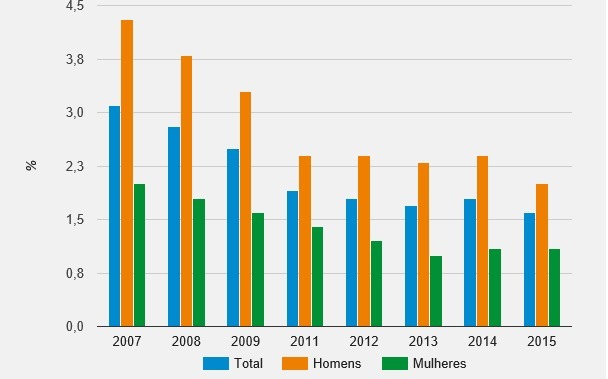Education in Brazil begins with the arrival of the Portuguese, when priests assumed the role of catechists and teachers of the Indians.
Thus, history has its beginning marked by the established relationship between religion and literacy, until the Jesuits were expelled from the country in 1759.
Only many years later, the responsibility for education fell to the State. But teachers were not prepared to teach.
People who had simply received some instruction, who were mostly priests, became teachers.
The democratization of education was finally leveraged in 1920. Anísio Teixeira was important in combating the restriction of education to a minority, as well as the relationship between education and religion.
History of Education
Brazil Colony
Formal education in Brazil began in 1549 when Father Manuel da Nóbrega arrived in the country. Literacy was restricted to boys, who learned to read and write while being converted to Christianity.
The main objective of the Jesuits was to spread religious teachings to their students, from whom they expected total obedience.
In 1759 the Marquis de Pombal expelled the Jesuits and imposed new rules. Education became state.
read Company of Jesus.
In 1760, despite the lack of specific teacher training, there was a competition for teachers. The lack of training meant that many priests became teachers, which maintained the proximity between religion and education.
But classes officially started 14 years later, that is, in 1774. During this long interval, private teachers taught the children of families that had this possibility in financial terms.
There was a title of nobility reserved for teachers, who were also exempt from some taxes. Despite this, they were not adequately compensated.
The classes were called royal classes, but after the resignation of the Marquis of Pombal D. Maria I changed the name to public classes.
Imperial Brazil
In the imperial period it was very difficult to pass the teachers' competition. Needing to increase the teaching staff, the State admitted teachers without qualifications, but paid them less.
The difficulty, however, was rewarded with the guarantee of a lifetime position, despite the fact that the remuneration was not worth it.
It was only in 1835 that the first teacher training schools emerged. However, moral and religious values were the most valued, even more than the knowledge held by teachers.
The vast majority did not recognize the importance of education. For this reason, parents did not send their children to school at the age of 5, as recommended by the reform, or as soon as they were literate, they were removed from school.
Brazil Republic
Benjamin Constant organized a reform in education, which contemplated the division by grades and according to age groups.
It is at this point that the figure of the school director appears, a position held by men.
The state put pressure on teachers to comply with the school program and not to fail students, which resulted in overspending and student evasion.
Among other educators, Anísio Teixeira he was one of the pioneers of the new pedagogy. She fought the restriction of education to elites and religious rapprochement.
In 1939, the Pedagogy course was created at the Pontifical Catholic University of Campinas (PUC-Campinas).
Paulo Freire, one of the greatest pedagogues in the world, proposes works in popular education.
In 1971, education began to be organized into primary, secondary and high school and compulsory until 14 years of age.
present
After so long, the precariousness of education is one of the social problems of our country. This is because there are children who still do not have access to formal education or the school they attend is full and offers few conditions. As a result, these children have fewer opportunities.
One of the biggest problems is that Brazil does not invest adequately in education, despite the fact that it invests more in education than some developed countries.
In addition to the financial issue, for example, situations of misuse of funds.
In addition to these issues, teacher training is also at issue. The truth is that there are teachers teaching subjects for which they have not received training, as well as receiving little incentive in terms of remuneration.
Finally, among the situations that require more attention are the reform of secondary education, the common national curriculum base (BNCC) and the crisis in higher education.
Data
According to the IBGE (Brazilian Institute of Geography and Statistics), between 2007 and 2014 there was a decrease in illiteracy and an increase in schooling for children between 6 and 14 years old. The level of Brazilian education also grew in the same period.
Illiteracy rate of people aged 10 to 14, by sex:

Source: IBGE, Research Directorate, Coordination of Work and Income, National Household Sample Survey 2007/2015.
However, when the subject is analyzed further, we are faced with the following reality, according to 2011 data provided by Instituto Paulo Montenegro:
- 27% of Brazilians are functionally illiterate (know how to read, but do not understand the meaning of what they read)
- 4% of higher education students are considered functionally illiterate
In the Pisa (International Student Assessment Program) of the OECD, Brazil ranks 63rd, 59th and 66th in science, reading and mathematics respectively.
Interested? See too:
- Illiteracy in Brazil
- School Inclusion: Concept and Challenges
- LDB (updated in 2019)
- Lesson plan (how to, model and examples)

